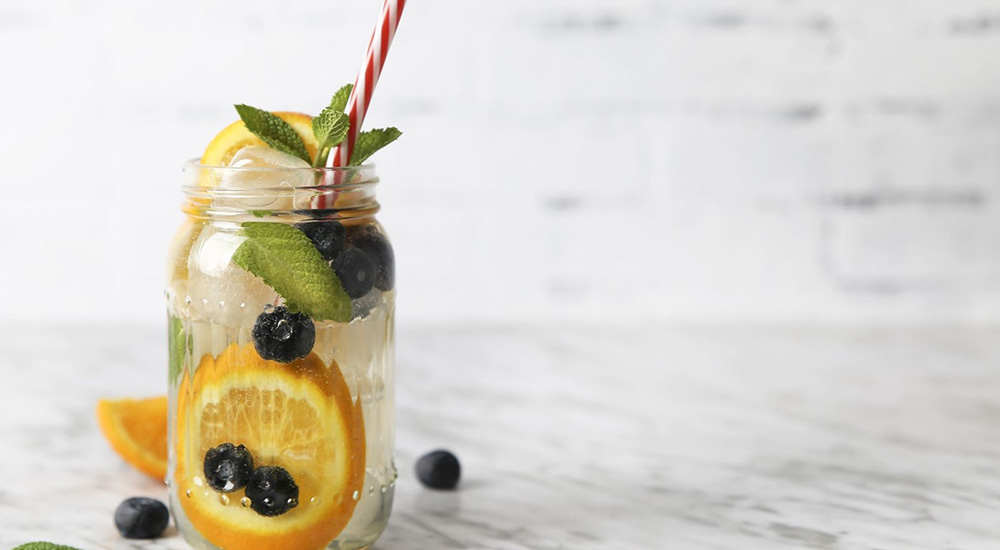“I drink a lot of water!” “I do okay. I should probably drink more.” “I don’t like the taste of water.” “Soda is the only thing that quenches my thirst.” “I don’t get thirsty so I never feel like drinking water.” “Does coffee count as water?”
Do any of these phrases sound like something you have said or thought? As a registered dietitian at the Milwaukee VA, I hear these and many other phrases when talking with Veterans about how much water they drink.
We know good hydration is key to optimal health, but how much do we really need? At this time of year when outside temperatures are climbing, it’s a good time to re-assess our water and hydration needs.
There are plenty of opinions about how much water we should be drinking. One size does not fit all. The National Academies of Medicine suggest that most women consume around 6-9 cups of fluids daily and 8-12 cups daily for men. This could include plain coffee or tea, sparkling water, seltzer and flavored water, as well as calorie-containing beverages like milk, fruit juice or vegetable juice.
But these guidelines are set lower than our actual water needs because they are assuming that we will get some water… 20% of our daily requirement… from the foods we eat as well.
Which foods are good sources of water?
The National Institutes of Health and the USDA have some guidance here. Most fruits and vegetables are 80-99% water. Yogurt is, too. This is just another reason to eat several servings of fruits and vegetables daily.
“But if I feel okay, why should I drink more water? How will it help me?”
Dehydration can be sneaky. We can be dehydrated even if we don’t feel thirsty, and the older you get the less you notice it. If our bodies are only mildly dehydrated, we may feel tired, a little lightheaded or dizzy, or even hungry. There are also some common medications, such as those used to treat high blood pressure, diabetes and depression, that can increase your risk of dehydration. Your VA primary care provider or pharmacist can advise you if you are at higher risk.
Regarding our long-term health
A recent study in eBioMedicine monitored over 15,000 people for 25 years using a common blood test called serum sodium. It found that “staying well hydrated may slow down the aging process and prevent or delay chronic disease.”
For more ways to make drinking water an enjoyable part of your day, check out “Why Try Flavor Infused Water?” Consider making an appointment with the dietitian at your VA Primary Care clinic to customize your approach to good hydration.
Topics in this story
Link Disclaimer
This page includes links to other websites outside our control and jurisdiction. VA is not responsible for the privacy practices or the content of non-VA Web sites. We encourage you to review the privacy policy or terms and conditions of those sites to fully understand what information is collected and how it is used.
More Stories
Veteran Byron Potier weighed almost 300 pounds and was tired and lethargic. He was the perfect candidate for gastric sleeve surgery.
How much do you know about VA care, benefits and services? Don’t miss out on what you've earned—check out the "2025 VA Federal Benefits Guide for Veterans, Dependents, Survivors, and Caregivers" handbook to learn more.
Feeling stressed? Your breath can help you relax and focus. Take 3 minutes to reset and prioritize your well being for this week's #LiveWholeHealth practice.







according to my cardio PT specialist. We should drink according to body weight. If you weigh 200 lbs., then close to half your weight but in oz… In this case 60 to 100 oz.. a day of water. Sorry but beverages with caffeine are not good and don’t count. They told our group that if you drink a cup of coffee, then you need to drink a cup of water. Caffeine constricts your blood vessels. Part of reason to drink as much water as possible is to keep flushing your kidneys. As you get older, it takes more to do this. If you don’t get enough water, flavored water or say Gatorade. Then that could lead to other problems within your body. Decaffeinated coffee or no caffeine soda or other drinks are okay and would count toward your daily water intake. I am just a vet going 3 days a week to PT. Once a week we get lectures on different ways to help our bodies as we age. If you have other questions, ask your doctor or message them. Good luck.
I didn’t read, or see where or how much exactly, the amount of water I need to drink. Plus the various weather conditions, indoor and outdoor activities, work environments, height and weight and age. Please provide this information.
Doesn’t really answer the question.
Why do writers make such broad useless statements such as “… most women consume around 6-9 cups of fluids daily and 8-12 cups daily for men.”
Most? Around? 6-9 cups? 8-12 cups?
This really is not helpful at all. What does “most” mean? What a cup? Is there is a universally understood definition of how much a cup consists of? Does the writer really think there is only one size cup in the world?
Doesn’t it make obvious sense to state xx ounces of fluids?
Let’s be helpful not confusing.
I agree it’s very broad but a cup is 8 oz. as far as measuring. Hope this helps.
As mentioned by Glynis, One cup measure, which is what the author is speaking of, equals 8 fluid ounces. 8-12 cups for a man equals 64-96 fluid ounces per day (1\2 gallon to 3/4 of agallon) depending on what one is doing, body size, ambient temperature, and the other variables the author mentions.